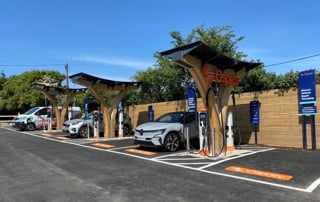A consultation to speed up the installation of electric vehicle (EV) charge points has been announced alongside new funding to boost numbers.
The Department for Transport (DfT) has launched a new grant to provide up to 75% of the cost to buy and install charge points, up to £2,500 per socket, up from the previous £350.
Accessible through the Workplace Charging Scheme, it is available for state-funded schools, colleges, nurseries and academies to boost the charge point facilities for staff and visitors.
It could also help schools to generate revenue by making their charge points available to the public.
The consultation, also launched today (Monday, February 5), includes proposals that would give EV charge point operators the right to carry out street works using a permit rather than a licence.
Permits can be issued much faster, taking days instead of months, and are significantly cheaper to obtain than licences, reducing costs for operators and speeding up the charge point rollout for drivers, says the DfT.
Furthermore, a new good practice guide has been published by the Government to improve consistency in processing licence applications across different areas.
Technology and decarbonisation minister Anthony Browne said: “This latest set of measures will mean EV owners everywhere benefit from easier and more convenient access to charge points.
“This Government has already spent over £2 billion to ensure a smooth switch to EVs, and we’re committed to supporting drivers as we transition towards net zero in a proportionate way that doesn’t burden working people.”
The school’s grant is for state-funded schools and education institutions, which must have dedicated off-street parking facilities – applications can be made online.
Independent schools may apply for funding through the Workplace Charging Scheme and the Electric Vehicle Infrastructure grant for fleets.
Minister for the school system and student finance at the Department for Education, Baroness Barran, said: “This is an exciting opportunity for schools across England to become part of an ongoing move towards a greener public sector.
“Schools engaging with this grant will be supporting the development of green infrastructure, helping to improve their local environments.
“Developing a greener education estate is a key element of our sustainability and climate change strategy.
“The expansion of this grant supports our ambition to improve the sustainability of our schools in the ongoing move towards net zero.”
The Government is also delivering the £381 million Local Electric Vehicle Infrastructure (LEVI) Fund to local authorities.
The first five local authorities in England have been approved for payments, totalling £14.2m, to develop EV charge point infrastructure, following successful applications to the fund.
The local authorities are: Bedford, East Sussex, North Yorkshire, and the London Boroughs Hackney and Hounslow.
Further announcements on successful local authorities that applied for funding this financial year are expected in the coming months.
Hugh Pickerill, programme manager for EV grants and infrastructure at Energy Saving Trust, said: “We’re pleased to see this funding go to innovative projects that will deliver thousands of chargepoints, increasing provision across England to meet the rapidly growing demand for electric vehicles.
"This funding is instrumental to accelerate EV uptake, and to contribute to improving air quality nationwide through lower emissions.”
In addition, as part of the LEVI funding, just under 100 dedicated EV officers have been newly recruited to support chargepoint procurement, aiding local authorities in building a skilled workforce and delivering their charging projects.
To aid local authorities in building a skilled workforce and delivering their charging projects, the Government is also launching the electric vehicle infrastructure (EVI) training course for their officers, which will open to all local authorities from mid-March following a successful trial.
Mark Constable, chair of Recharge UK, said: “The new approaches under consultation will enable the market to deploy charging much more quickly and at significantly lower cost, from rapid charging to the emerging segment of cross-pavement solutions."























Login to comment
Comments
No comments have been made yet.